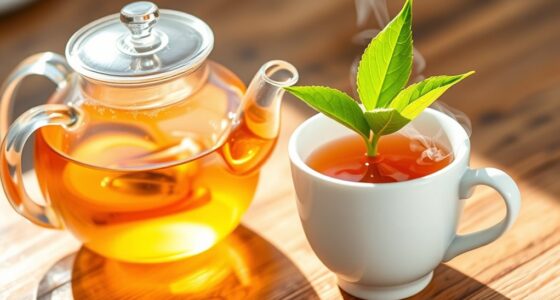When comparing teas for health benefits, consider their antioxidant levels and caffeine content. Green tea is high in catechins, offering strong antioxidants with less caffeine, ideal for health boosts. Black tea contains powerful theaflavins and more caffeine, providing an energizing effect. Herbal teas are naturally caffeine-free and rich in antioxidants from various herbs. Knowing these differences helps you choose teas tailored to your wellness goals; keep exploring to discover more about their unique benefits.
Key Takeaways
- Green tea offers high levels of catechin antioxidants and moderate caffeine, supporting cell protection and alertness.
- Black tea contains theaflavins and thearubigins antioxidants, with higher caffeine for increased energy.
- Herbal teas provide diverse antioxidants from herbs and plants, typically caffeine-free, ideal for relaxation.
- Combining different teas can maximize antioxidant intake while balancing caffeine levels to suit individual health goals.
- Personal preferences and health needs guide whether to choose green, black, or herbal teas for specific benefits.

Tea has long been celebrated for its potential health benefits, but not all teas are created equal. When you’re choosing a tea to boost your well-being, understanding its antioxidant content and caffeine levels can make a significant difference. Antioxidants are compounds that help neutralize free radicals in your body, potentially reducing the risk of chronic diseases. Different types of tea vary widely in their antioxidant levels, so knowing which teas pack the most punch can guide your choices. For instance, green tea is renowned for its high antioxidant content, primarily due to its rich catechin profile. These antioxidants are potent and can help protect your cells from oxidative stress, which is linked to aging and various health issues. Black tea also contains antioxidants, but in different forms, such as theaflavins and thearubigins, which develop during the oxidation process. If you’re looking to maximize antioxidant intake, incorporating both green and black teas into your routine can be beneficial. However, herbal teas, which are technically not true teas, also offer antioxidants from various herbs and plants, making them another good option for health-conscious drinkers.
Caffeine levels are another essential factor to consider when comparing teas for health benefits. Caffeine acts as a stimulant, boosting alertness and focus, but too much can lead to jitters, insomnia, or increased heart rate. If you’re sensitive to caffeine or trying to limit your intake, you’ll want to choose teas with lower caffeine levels. Green tea generally has less caffeine than black tea, making it a gentler option for those who want a mild energy boost without overdoing it. Black tea, on the other hand, is typically more caffeinated, providing a more robust lift, which some people prefer in the mornings. Herbal teas are usually caffeine-free, making them an excellent choice for relaxing or winding down in the evening. It’s essential to weigh your personal caffeine tolerance and health goals when selecting the right tea. For example, if you’re looking for a gentle, antioxidant-rich beverage without caffeine, herbal infusions like chamomile or rooibos are perfect.
Ultimately, your choice of tea depends on your health priorities—whether you’re after antioxidants, caffeine content, or both. By knowing the differences in antioxidant content and caffeine levels, you can tailor your tea consumption to support your well-being. Each tea offers unique benefits, so exploring a variety can help you find the perfect balance that fits your lifestyle and health needs.
Frequently Asked Questions
Which Tea Has the Highest Antioxidant Content?
You’ll find that matcha tea has the highest antioxidant levels among various tea varieties. Its unique growing process and shade cultivation boost catechin content, making it a powerful antioxidant source. By drinking matcha regularly, you can maximize your intake of these beneficial compounds. Other teas like green, black, and white also offer antioxidants, but matcha stands out for its concentrated levels, giving you more health benefits with each cup.
Are Herbal Teas Beneficial for Specific Health Conditions?
Did you know that herbal teas, made from medicinal herbs, can target specific health issues? They’re often used as herbal remedies for conditions like anxiety, digestive problems, and inflammation. By choosing the right herbal remedy, you can support your health naturally. Herbal teas contain bioactive compounds that may boost immunity or soothe symptoms, making them a popular option for personalized health care. Always consult a healthcare professional for tailored advice.
How Does Green Tea Compare to Black Tea in Health Benefits?
You’ll find green tea offers more antioxidants due to minimal processing, which helps fight free radicals and may boost your metabolism. Black tea undergoes full fermentation, giving it a richer flavor but slightly fewer antioxidants. Caffeine levels are higher in black tea, providing a stronger energy boost, while green tea has less caffeine, making it a gentler option. Both support heart health, but your choice depends on your caffeine preference and health goals.
Can Tea Consumption Improve Mental Health or Cognitive Function?
Think of tea as a mental boost, like adding fuel to your brain’s engine. Drinking tea can improve cognitive function and mental health by increasing alertness and reducing stress. The caffeine in tea, combined with compounds like L-theanine, promotes mindfulness meditation and focus. Regular tea consumption, especially green or black, supports memory and concentration, helping you stay sharp throughout the day.
Are There Any Risks Associated With Drinking Large Quantities of Tea?
Drinking large amounts of tea can pose risks like caffeine dependence, which may cause headaches, irritability, or sleep problems. Excessive tea consumption might also hinder mineral absorption, especially iron and calcium, leading to deficiencies. To stay safe, enjoy tea in moderation, and be mindful of your body’s responses. Limiting intake helps prevent dependency and guarantees you receive the health benefits without unintended side effects.
Conclusion
So, whether you’re team green, black, or herbal, it’s clear they all promise health perks—just don’t expect them to turn you into a superhero overnight. Sip away, knowing your favorite brew might boost your mood or fight off a cold, or maybe just give you an excuse for another round. After all, who needs vitamins when you’ve got a steaming cup of “super tea,” right? Cheers to health—sort of!










